|

Queensboro Bridge
February 9, 1910
Eugene de Salignac
Historic Photos From the NYC Municipal Archives
atlantic
NYC Municipal Archives
_______________________
Bartle by & Co.
Enrique Vila-Matas
Translated by Jonathan Dunne
google books
49)
In his biography ofJoyce, Richard Ellmann describes the
following scene, which took place when Joyce was fifty and
Beckett twenty-six, and which could have come straight from
the theatre of the No:
"Beckett was addicted to silences, and so was Joyce; they
engaged in conversations which consisted often of silences
directed towards each other, both suffused with sadness,
Beckett mostly for the world, Joyce mostly for himself. Joyce
sat in his habitual posture, legs crossed, toe of the upper leg
under the instep of the lower; Beckett, also tall and slender,
fell into the same gesture. Joyce suddenly asked some such
question as, 'How could the idealist Hume write a history?'
Beckett replied, 'A history of representation.'"
.....................................................
61)
The melancholy of the writing of the No reflected in the
cups of tea no less, next to the fire, in Alvaro Pombo's house
in Madrid.
In the dedication of La cuadratura del ctrculo, we can read:
"To Ernesto Calabuig in memory of the thousand or so
quartos which we meticulously wrote, rewrote and threw into
the waste-paper basket and which now, with that warm air
of satisfied perpetuity, in this abruptly wintry evening in the
middle of June in Madrid, are reflected in the cups of tea,
next to the fire."
Suddenly the melancholy of the writing of the No was
reflected in one of the glass beads in the chandelier hanging
from my study ceiling, and my own melancholy helped me to
see reflected there the image of the last writer, with whom
sooner or later, because it has to happen, without witnesses,
the small mystery of literature will disappear. Naturally,
whether they like it or not, this last writer will be a writer of
the No. I thought I saw them a few moments ago. Guided by
the star of my own melancholy, I saw them listening to that
word, the last of all, falling silent, dying along with them.
_______________________

motorman
near Williamsburg Bridge
September 25, 1924
Eugene de Salignac
_______________________
A Joyful Summit, part 1: Tom Raworth & Anselm Hollo
A Joyful Summit, part 2: Andrei Codrescu & Gunnar Harding
a joyful summit of old savages
SJ Fowler
3am
(....)On Wednesday April 18th at the Horse Hospital in Bloomsbury, London, a privileged few were on hand to witness a rare occurrence that contradicted the often maudlin passing of the older generation. Four great poets who came to prominence in the 1960’s and have all maintained a relentless, brilliant and imperative writing practise in the fifty years or so since, read together, in reunion, with great humour, dignity, intelligence and generosity. Their mastery of poetry and their affability of manner provided the many in attendance, poets and readers of poetry what alike, an example of what might be the fruit of a lifetime spent as a poet – honest to conviction, ever humble in the service of is new, and what is exciting, about writing and reading poetry. ...(more)
_______________________

Carolta Campins
by Joaquim Renart, 1904
The Bookplate Collection
BibliOdyssey
Part II
50Watts
John Starr Stewart Collection
University of Illinois
_______________________
Meta:
Research in Hermeneutics, Phenomenology and Practical Philosophy
_______________________
Apeira
journal of cultural and architectural theory
...an independent journal focused on how the exploration of ideas, and particularly their historical ties with architectural topics, can lead to new ways of understanding and undertaking cultural work.
_______________________
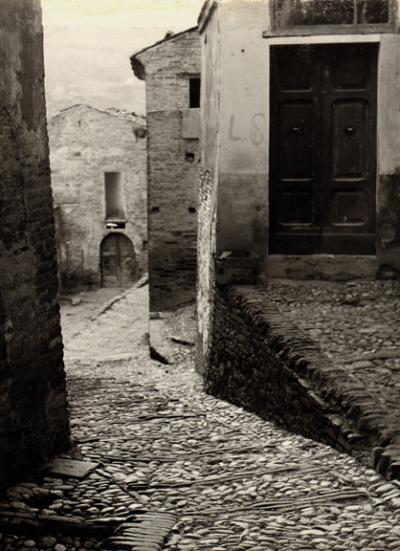
Vicolo
L.K. Ratschiller
c.1955
Point Of View
Vintage Photographs Of Italian Urban & Suburban Landscape
Keith de Lellis Gallery
via
_______________________
Calligrammes: Poems of Peace and War (1913-1916) [pdf]
Guillaume Apollinaire
Translated by Anne Hyde Greet
ubu
Chains
Cords made of cries
Sounds of bells across Europe
Hanging centuries
Rails binding the nations
We are only two or three men
Free of all chains
Let's join hands
Violent rain combing the smoke
Cords
Woven cords
Submarine cables
Towers of Babel changed to bridges
Spider-Pontiffs
All the lovers a single chain has joined together
Other more tenuous chains
White rays of light
Cords and Concord
I write only to exalt you
Oh senses oh cherished senses
Enemies of memory
Enemies of desire
Enemies of regret
Enemies of tears
Enemies of all I still love _______________________

Queensboro Bridge
August 8, 1907
Eugene de Salignac
_______________________
Prison Industries: "Don't Let Society Improve or We Lose Business"
Dina Rasor,
One out of every 100 people in the United States is imprisoned. Even though we are 5 percent of the world's population, we have 25 percent of the prisoners in the world. We are number one in the world in the number of people we imprison - we even beat China.
(....)
If you have any doubt in your mind that improving society and lowering the number of prisoners in our country (normally considered a worthy social goal) is a threat to the prison industry business, all you need to do is to read about that concern in The GEO Group's 2011 annual report:
In particular, the demand for our correctional and detention facilities and services and BI's [a prison industry company Geo acquired in 2011] services could be adversely affected by changes in existing criminal or immigration laws, crime rates in jurisdictions in which we operate, the relaxation of criminal or immigration enforcement efforts, leniency in conviction, sentencing or deportation practices, and the decriminalization of certain activities that are currently proscribed by criminal laws or the loosening of immigration laws. For example, any changes with respect to the decriminalization of drugs and controlled substances could affect the number of persons arrested, convicted, sentenced and incarcerated, thereby potentially reducing demand for correctional facilities to house them. Similarly, reductions in crime rates could lead to reductions in arrests, convictions and sentences requiring incarceration at correctional facilities. Immigration reform laws which are currently a focus for legislators and politicians at the federal, state and local level also could materially adversely impact us.
This is an industry that needs misery, long sentences, rounded-up undocumented immigrants and increasing crime to flourish. In order to keep the prison beds filled, The GEO Group and others have paid out millions of dollars to lobbyists, federal and state legislators, and governors to allow our immigration problem to go unsolved, to make sure that no drugs are decriminalized and that an ineffective War on Drugs continues, and to make certain that long term prison sentences, like California's three-strikes-and-you're-imprisoned-for-life laws, keep a steady flow of revenue and profits flowing to their shareholders. They are also hoping that our national drop in crime is just a temporary trend....(more)
_______________________
The Big Empty
Eating Cheetos with the hungry ghosts of the corporate state
Phil Rockstroh
(....)
From time to time, I have been asked, how does one cope with the ever increasing “complexity” of our age. Short answer: It would be ill-advised to become adapted to a madhouse.
Instead, attempt to view complexity as future compost. At this stage, a song of grief is as resonate as a song of ebullience…Rot ensures renewal; the future is compost and compost is the future. Thus: Rejoice in the reek. Mortification restores our humanity, turning us away from the tyranny of unchecked proliferation. It bestows us with the ability to love our limits.
In this, it is synonymous with grace....(more)
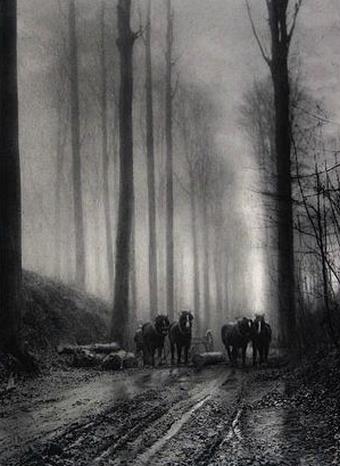
Dans La Foret
Leonard Misonne
1870-1943
1 2
_______________________
The Largest Glue Factory in the World
William Allen
common-place
The Endless Chain
I smell Epsom, lime, and sulfur in the wind today off toadfish mudflats.
Cord grass matted with mud snails, tern quills, a stink of conch decay.
Picture tidal mills that pock the marshes of New York, years before
a crossing of the Brooklyn Ferry. Grinding corn at Gerritsen's near
Mill Basin, along the Bushwick creeks, where breweries sprang up
by pigsties, mill wheels driven by Peter Cooper's saw-tooth chain.
Picture the East River with cable iron to replace the narrow boats,
barge mules, dike dogs, and towpaths of the canal at Canajoharie.
I dream lug nuts, gear parts, for mechanical advantage, propelling
elevated trolleys along Third Avenue, dripping creosote and ash
onto a maze of pushcarts, with steam and smoke of locomotives
down below. I keep inventing things to let the pull of sea and air
do the heavy lifting, like an American language unburdening itself,
like the endless chain of our forged relations, hauling us forever on. ...(more)
_______________________
On Lisa Robertson’s Nilling
Sina Queyras
Nilling, Robertson’s latest, is just out from BookThug. It’s a collection of prose essays “On Noise, Pornography, The Codex, Melancholy, Lucretius, Folds, Cities, and Related Aprorias.” It’s dense, and lush. Scan the pages and your vocabulary puffs up with delight. You realize how pale poetry can be. You realize you are starved. You remember too that to create you need to be inspired. You need to have ideas. You need to tap in to the thrum of intellectual desires as much as experience the physical, note the bodily sensations. All work begins in the archive, Robertson has said, and you feel the archive here. That, and the Wordworthian contemplation before the spilling of corseted, buttressed, emotion. Only after weeks of reading does Robertson begin to write. Reflection is what we are starved for. Reaction we have in abundance.
(....)
“It (melancholy) is a system that functions to pose a seemingly boundless cognitive space where transformation, never a neutral event, always a grievance or an astonishment, can claim potential…” and later, “melancholics concern themselves with the structure of doubt, rather than the structure of belief, because doubt is inventive. Doubt complicates. Even repudiation is a doubling. In this sense doubt is erotic, as is melancholic space. Doubt, eros, melancholy: affective ornaments”.
This is a point of tension for the Lyric Conceptualist though, because it’s hard to believe that belief cannot be inventive…by that logic faith is limiting. Faith, hope, praise become the dead weight of the lyric....(more)
NillingOn Noise, Pornography, The Codex, Melancholy, Lucretius, Folds, Cities, and Related Aprorias Lisa Robertson
_______________________
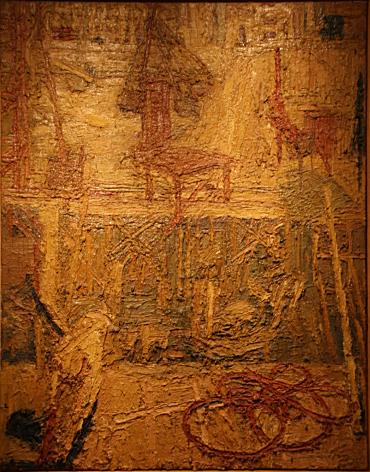
Oxford St. building site
Frank Auerbach
b. April 29, 1931
_______________________
Radical Philosophy
173 (May/Jun 2012)
Pirate Radical Philosophy
Gary Hall
Much has been written about the ‘crisis of capitalism’ and the associated events known, for short, as the ‘Arab Spring’, ‘student protests’, ‘Occupy’ and ‘August riots’. Yet to what extent does our contemporary situation also pose a challenge to those of us who work ‘in’ the university – a challenge that would encourage us to go further than merely endeavouring to ‘just say “no”’ to the idea of universities operating as for-profit business in order to serve the economy, and demanding a return to the kind of publicly financed mass education policy that prevailed in the Keynesian era? What if we, too, in our capacity as academics, authors, writers, thinkers and scholars want to resist the continued imposition of a neoliberal political rationality that may appear dead on its feet but is still managing to blunder on? How can we act not so much for or with the student protesters, ‘graduates without a future’, ‘digital natives’ and ‘remainder of capital’ (protesting alongside them, accepting invitations to speak to and write about them and so on), but in terms of them?2 What if we desire a very different university to the one we have, but have no wish to retain or restore the paternalistic, class-bound model associated with the writings of Arnold, Leavis and Newman? While appreciating the idea that there is an outside to the university is itself a university idea, and that attempts to move beyond the institution too often leave it in place and uncontested, is it possible to take some impetus nonetheless from the emergence of autonomous, self-organized learning communities such as the Public School, and free textsharing networks such as AAAAARG.ORG (to name but two)? Does the struggle against the ‘becoming business’ of the university not require us, too, to havethe courage to try out and put to the test new economic, legal and political systems and models for the production, publication, sharing and discussion of knowledgeand ideas; and thus to open ourselves to transforming radically the material practices and social relations ofour academic labour?...(more)
AAAAARG.ORGfree registration req.
_______________________
Digital Dead End
Fighting for Social Justice in the Information Age
Virginia Eubanks
mit press
google books
pdf at Monoskop/log
_______________________
Battle for the Internet
Guardian (UK) series
_______________________
Why I Don’t Trust the Cloud
Kenneth Goldsmith
I love the idea of the cloud, but I hate the reality of it. The reality of it is nothing like what’s been promised to us. Trusting the cloud is a mistake: it’s too centralized, too easily blocked, too easily controlled. And it’s privatized, owned, and administrated by someone other than you.
(....)
I feel terrible for folks who put their trust in the cloud, building beautiful libraries of cultural materials to share with others, only to have it collapse overnight: castles made of sand, indeed. While much copyrighted material was hosted on these servers, the circles in which I moved tended to host out of print and orphaned works. The tragedy of seeing libraries like these decimated (and often attempt to rebuild again on the cloud: don’t they ever learn?) is absolutely heartbreaking. But it’s equally upsetting to see how frightened people are of copyright: the mere threat of it—not the reality of it—has collapsed an entire once-vibrant cultural ecology.
Don’t trust the cloud. Use it, enjoy it, exploit it, but don’t believe in it. Or even the web for that matter. Many people assume that the web —and its riches—will always be there waiting for you. It won’t. Don’t bookmark. Download. Hard drives are cheap. Fill them up with everything you think you might need to consult, watch, read, listen to, or cite in the future. Your local library should be more vast than anything up for offer on the web. Please understand that the web and its treasures are temporary and ephemeral; that Deleuze PDF that you bookmarked yesterday very well may not be there tomorrow....(more)
_______________________
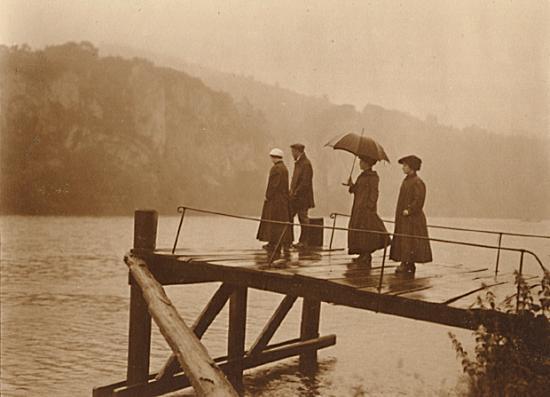
Waiting at the Dock
Leonard Misonne
1920s
_______________________
Tracing May 1, from Haymarket to Occupy May Day
rabble
May Day's Radical History: What Occupy Is Fighting for This May 1st
Jacob Remes
The Origins and Traditions of May Day
Eugene Plawiuk
_______________________
Absolute Negativity, Occupy and Situationists
Ron Kelch
_______________________
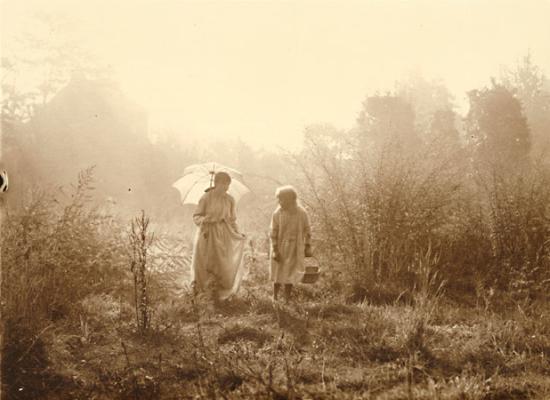
A Parasol and a Stroll
Leonard Misonne
1920s
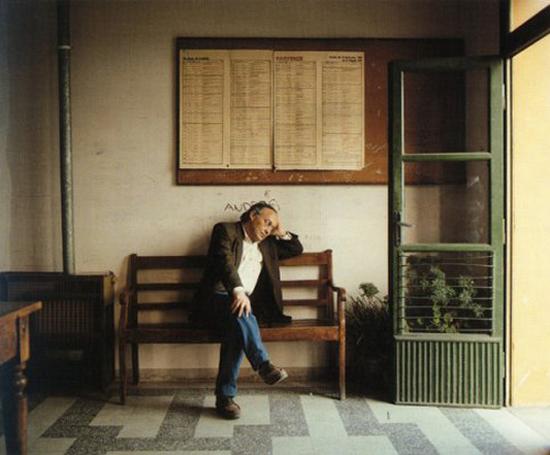
Luigi Ghirri
1943 –1992
1 2 3
_______________________
The Book of Delusions
E.M. Cioran
translated by Camilia Elias
Have you ever felt the beginning of motion, have you ever been tormented by the first departure of the world from itself? Have you ever touched the first pure shiver of motion, the prime ecstasy of becoming, the initial vortex of time? Have you never felt that moment of the first confusion, in the iridescent fever of your body and your soul? It is as if in a moment of forgetfulness and eternity, a spark that comes out of nowhere lights fires in space and projects lights onto the dark immensity, and makes strange contours against the gray background of space. This is the feel of the first motion! Do we not, then, live as the source of motion, as the first bumping flip of the world? And does it not exist in our fever, that concentration of motion, the centering of becoming in our impetus? He who has not felt how the world’s motion was gathering in him in a whirl, in whose bubbling unending and unknown worlds roam, will never understand why, after such moments, man becomes essentially an other, a being taken out of beings; likewise, nor will he understand how one single day containing such uninterrupted moments of lightning would be enough to consume his being completely.
...(more)
_______________________

Violet Hour
“At the violet hour, when the eyes and back
Turn upward from the desk, when the human engine
waits
Like a taxi throbbing waiting.”
The Waste Land, T. S. Eliot.
Literary Paint Chips
The Paris Review
_______________________
We Did Not Make Ourselves
Michael Dickman
from The End of the West
Copper Canyon Press, 2009
(....)
*
I didn’t make my brain
but I’m helping
to finish it
Carefully stacking up everything I made next to everything I ruined
in broad daylight in bright
brainlight
This morning I killed a fly
and didn’t lie down
next to the body
as we’re supposed to
We’re supposed to
Soon I’m going to wake up
Dogs
Trees
Stars
There is only this world and this world
What a relief
created
over and over
_______________________
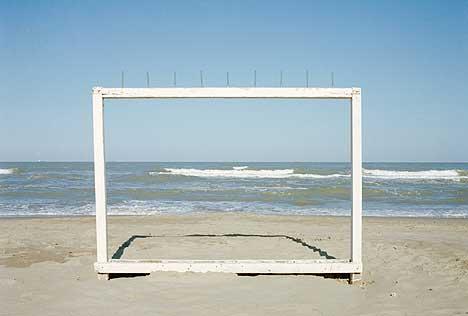
Luigi Ghirri
_______________________
Shift Happens
David Weinberger
The Chronicle Review
If you've seen that bumper sticker, you've seen what our culture has made of one of the central ideas in Thomas Kuhn's The Structure of Scientific Revolutions, published 50 years and 1.4 million copies ago. For the marketers and boosters of personal transformation who casually talk about paradigm shifts, the phrase designates not just a gestalt switch that casts things in a new light, but a world so insubstantial that it can be thoroughly transformed by a single idea. Tomorrow there may be another paradigm shift, and another after that. There is thus no real progress, just a new bubble as good as the old bubble.
This is of course not what Kuhn intended us to learn. Kuhn wanted to free us from the illusion that knowledge is independent of history and of the sociality that marks us as humans, but he did not think that all beliefs that our history and sociality put before us are equally worthy. Indeed, he quickly moved away from the "shift happens" conception of paradigms as bundles of beliefs, emphasizing instead that they're examples of good scientific practice that researchers apply in their daily work.
But Kuhn is not blameless for how we appropriated his thought....(more)
_______________________
Hybrid Pedagogy
A Digital Journal on Teaching & Technology
The Four Noble Virtues of Digital Media Citation
Pete Rorabaugh and Jesse Stommel
via Digital Humanities Now
_______________________
International Journal of Heritage in the Digital Era
Volume 1, Number 1 / March 2012
_______________________
Peace, Conflict and Development: An Interdisciplinary Journal
Special Issue of PC&D – Approaches to Peace and Conflict, what is missing?
_______________________
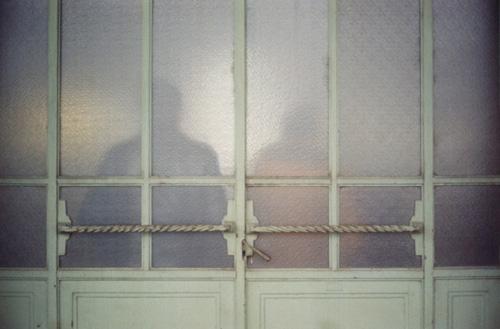
Luigi Ghirri
_______________________
The State of Poetry
Richard Hoffman
(....)
Like most poets, my books are published by a small press, seldom reviewed, and never in those few publications that seem to matter. You won’t find my work in anthologies or in discussions of contemporary poetry. This is not a complaint, only a way of offering you my credentials for NOT talking about a career in poetry: I don’t have one.
But I have a life that is largely made of poetry, of the poetry of others, both the dead and the living, and the poetry I try to write. I would not exchange that life, that ongoing education, that continual growth, for anything. Poetry returns to me the things I know and have forgotten, and among those things there dwells the deepest and oldest and least distorted version of myself: that consciousness that first looked for the right words, the right nouns, verbs, adjectives — the right sounds — to make sense of the world.
...(more)
_______________________
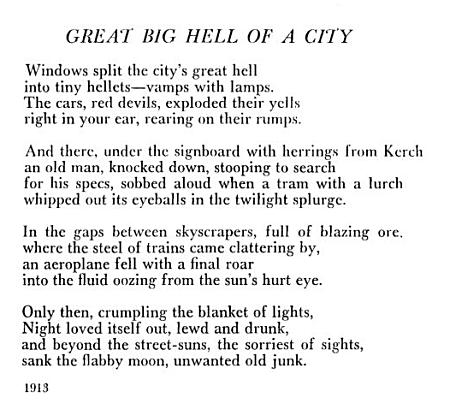
The Collected Poems of Vladimir Mayakovsky
trans. Dorian Rottenberg
ubu
_______________________
The Power of Fear in Networked Publics
danah boyd
SXSW (Austin Texas): March 10, 2012
Introduction
My talk today rests on three foundational claims and one critical question.
Foundational Claims:
1. We live in a culture of fear.
2. The attention economy provides fertile ground for the culture of fear.
3. Social media is amping up the attention economy.
Thus, my question is simple: as technologists and designers invested in developing the future, what hath we wrought?
The goal of my talk today is to explore the role of social media in perpetuating the culture of fear. How do those using social media leverage fear? How is fear spread through social media? When and where can technology combat fear? What are the social costs of that fear?
When it comes to talking about social media, it's easy to get trapped in utopian and dystopian rhetorics. My goal is not to go down one of these rabbit holes, but rather, to critically interrogate our participation in the culture of fear. Many of you are technologists, designers, pundits, and users. How are we contributing to or combating the culture of fear? What are our responsibilities with regard to the culture of fear? What kinds of things can and should we do?
Technology can be a very powerful tool, but it behooves us not to think of it as neutral. One of my favorite maxims about the role of technology in society is called Kranzberg's First Law. He argues that "technology is neither good nor bad - nor is it neutral." Given this, it's irresponsible to assume that the tools we're building just wander out into the world with only positive effects. What we design and how we design it matters. And how our systems are used also matters, even if those uses aren’t what we intended.
I am a geek. And in many ways, this talk is directed at other geeks. As geeky tools have gone mainstream, those of us who are contributing to the production and dissemination of them need to really consider our role in these cultural processes. Technology is no longer just about the geeks. Social media is no longer just about the geeks. And, regardless of how much we may wish otherwise, our tools are not geek-ifying mainstream values. So while many of us geeks may want to play ostrich and live in our special geek bubble, that’s neither responsible nor practical. It’s time that we understand that our systems have power. And, as a result, our decisions have consequences. ...(more)
_______________________

photo - mw

photo - mw
_______________________
from Unusual Woods
Gene Tanta
Almost Island
(....)
(turn) in the fast darkness of ancient forests,
shadows cross our dreaming faces (turn)
in the movies, an oak tree is always more there
after it’s gone (turn)
this way, a saw emphasizes one thing (turn)
formalwear, night fog rolling in
dressing the silver-blown accessories
(turn) in the morning,
when the rain goes to work,
the cemetery trees shade the cemetery dead
and spiders (turn) play the harps of corners
when the wind sighs, weathercocks turn
to look for a reason (turn)
...(more)
Unusual Woods
Gene Tanta
BlazeVOX
_______________________
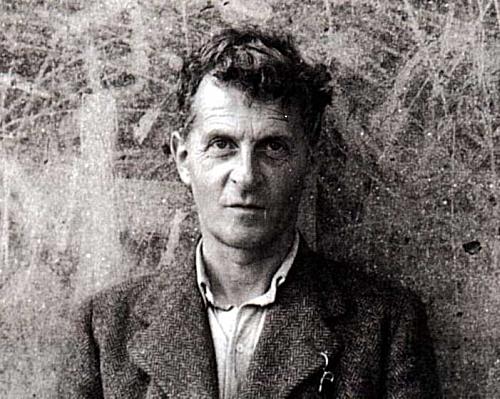
Ludwig Wittgenstein
b. April 26 1889
Photographed by Ben Richards
1947
Tractatus Logico-Philosophicus
Lugwig Wittgenstein
Hypertext of the Ogden bilingual edition
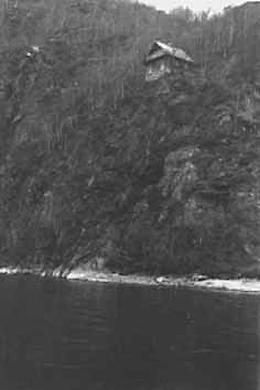
Wittgenstein’s house
near Skjolden, Sogneflord, Norway
1914
Wittgenstein: After Norway
Tom Clark
Ludwig Wittgenstein: A Biographical Sketch
_______________________
Wittgenstein's Dream
Peter Porter
1929-2010
I had taken my boat out on the fiord,
I get so dreadfully morose at five,
I went in and put Nature on my hatstand
And considering the Sinking of the Eveninglands
And laughed at what translation may contrive
And worked at mathematics and was bored.
...(more)
Peter Porter at Poetry International Web and the Poetry Foundation
_______________________
That Obscure Object of Desire
Ryan Ruby
conjunctions
(....)
A homuncular percussionist, you see, had installed himself in my chest, where he was playing my pulse in odd time signatures. Instead of a motley assortment of paint cans and plastic tubs, he was using my heart for a snare, my stomach for a ride, and the two hemispheres of my brain for his toms. I paced the platform, from one end to the other, incapable of standing still. I watched familiar objects like trash cans, signboards, staircases, backpacks, and human faces dissolve into hideous shapes and colors. No joke was necessary to elicit from my lips a dry cackling. Unidentified vermin flew across my path and disappeared. Was it that they were moving too fast? Or that they were not there at all?
(....)
Meanwhile, my autonarrator was on autopilot, slurring his words, having selected as his imperative speed rather than sense. How had I contracted this lunatic! I wondered, crumpled-up, dirty fingernails to throbbing temples. Of our cannonball journey across the Manhattan Bridge, he pontificated: Ligature is a training pants of moolvee like a stringency of beadledom; and as we pass through them they prove to be many-colored lentigos which paint the world federalism their own huff and each shows only what lies in its own foetation. Which observation was punctuated by a series of tourettic ejaculations, a half a dozen plips, knuffles, and screes that hardly deserve, even by the low standards of this crushing avalanche of logorrhea, to be called speech. This, I thought, this must be rock bottom.
To every obsession, its object. In my case, it was a book: Inferno, by August Strindberg.
Why this particular object and not some other?
...(more)
_______________________

photo - mw
_______________________
Logos 2012: vol. 11, issue 1
Marcuse's and Fromm's Correspondence with the Socialist Feminist Raya Dunayevskaya:
A New Window on Critical Theory
Kevin B. Anderson
Modernism, Surrealism, and the Political Imaginary
Stephen Eric Bronner
(....)But first there was Dada.
(....)
Dada mirrored a world gone mad with its own madness: its pranks, jokes, irony, playful barbarism, rejection of society, celebratory individualism, and expansion of the material and methods employed by the visual arts all served its protest (and served to define the political limits of that protest). The aesthetic violence directed by Dada against art was meant to yield anti-art. Defined by what it opposed, indeed, anti-art was soon bound for the museum. Certain members of the movement were explicitly political from the beginning, such as George Grosz and John Heartfield. [Few] of the Dadaists, however, were ever connected with pacifist or even revolutionary elements of the international labor movement.6 [Few] of them were particularly concerned with the important antiwar gatherings that took place at Zimmerwald and Kienthal in 1915–16, let alone the postwar proletarian rebellions that rocked Europe in the aftermath of World War I.7 Dada was uninterested in organized political engagement. Its resistance was bohemian in style, vague in purpose, and without any connection to the masses. Indignation rather than resistance best defines the sensibility of the Dadaist, which emerged just as trench warfare was turning men into material and individual battles were costing the lives of hundreds of thousands of soldiers. Civilization thus did appear at an end—and Dada celebrated its passing. Nevertheless, for better or worse, it was ultimately “civilization” that lived and Dada that died.
Surrealism was Dada’s heir. The new movement was more conscious of its aesthetic influences and more explicit in its political posture. ...(more)

Adelaide Arcade
1886
Samuel White Sweet
(1825 - 1886)
via
_______________________
The Truth in Pudding
Charles Bernstein
presented by Jerome Rothenberg
(....)
I don’t want interdisciplinarity but nondisciplinarity.
Something there is that doesn’t love a frame
That wants it laid bare.
Before I made a frame I'd ask to know
What I was framing in or framing out.
Two frames diverged on the common road
& I, I could not choose the one for the other
So stood, astounded, in place.
For frames are what we are inside of.
Two frames are better than one
Three's the thicket.
(....)
Imagine poetry as a series of terraces, some vast, some no bigger than a pinprick, overlooking the city of language. The sound and light show begins in the dark: sentences dart by, one by one, forming wave after wave of the rag and boneshop of the quotidian, events passing before our eyes like the faint glimmer of consciousness in an alcoholic stupor. Facts, facts everywhere but not a drop to drink.
Now it is dawn, now night, now noon, now morning. It’s as if the day never ends, it just keeps coming back for more.
Language is an event of the world, just as, for language users, the world is an event of language. Even the world is a word.
...(more)
_______________________
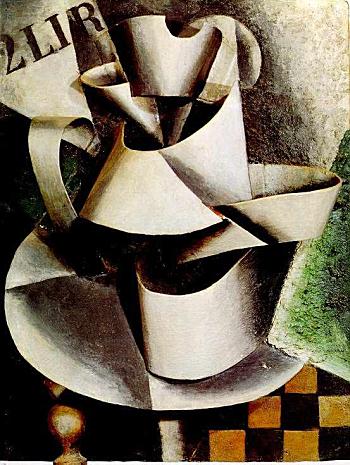
Liubov Popova
b. April 24, 1889
_______________________
Critique and the Hermeneutics of Suspicion
Rita Felski
(....)
The “hermeneutics of suspicion” is a phrase coined by Paul Ricoeur to capture a common spirit that pervades the writings of Marx, Freud, and Nietzsche. In spite of their obvious differences, he argued, these thinkers jointly constitute a “school of suspicion.” That is to say, they share a commitment to unmasking “the lies and illusions of consciousness;” they are the architects of a distinctively modern style of interpretation that circumvents obvious or self-evident meanings in order to draw out less visible and less flattering truths. Ricoeur’s term has sustained an energetic after-life within religious studies, as well as in philosophy, intellectual history, and related fields, yet it never really took hold in literary studies. Why has a field that has devoted so much of its intellectual energy to interrogating, subverting, and defamiliarising found so little use for Ricoeur’s phrase?...(more)
M/C Journal, Vol. 15, No. 1 (2012) - 'suspicion'
Suspicious Images: Iconophobia and the Ethical Gaze
Chari Larsson
M/C Journal, Vol. 15, No. 1 (2012) - 'suspicion'
_______________________
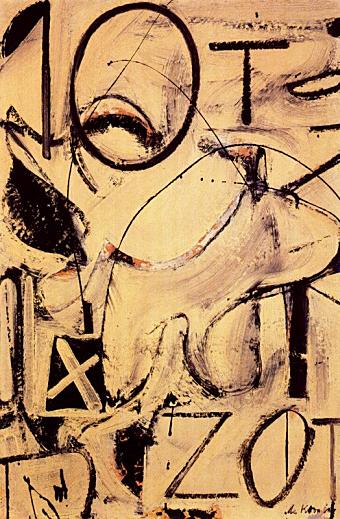
Zśrich
1947
Willem de Kooning
b. April 24, 1904
_______________________
Journal of Applied Hermeneutics
"The Memories of Childhood Have No Order and No End":
Pedagogical Reflections on the Occasion of the Release, on October 9th, 2009 of the Re-Mastered Version of the Beatles' Sergeant Pepper's Lonely Hearts Club Band
David Jardine
“The memories of childhood have no order, and no end.”
from Dylan Thomas’s Reminiscences of Childhood
We are no longer able to approach this
like an object of knowledge, grasping,
measuring and controlling. Rather than
meeting us in our world, it is much more
a world into which we ourselves are
drawn. [It] possesses its own worldliness
and, thus, the center of its own Being so
long as it is not placed into the object-
world of producing and marketing. The
Being of this thing cannot be accessed
by objectively measuring and estimating;
rather, the totality of a lived context has
entered into and is present in the thing.
And we belong to it as well. Our orientation to it is always something like our
orientation to an inheritance that this
thing belongs to, be it from a stranger’s
life or from our own.
From Hans-Georg Gadamer (1994,
p. 192), Heidegger’s Ways.
Reminiscence I
All this is certainly more than twenty years ago today. Grade 11 English class, Winter 1967, some time after February 2, 1967.
I’m mentioning this because I still re- member that date, February 2, 1967, was when I first heard the latest Beatles single, Penny Lane/Strawberry Fields Forever, over an American AM radio station that crackled its way to southern Ontario, to Burlington, one evening whose details are lost to memory. Was it WBZ from Boston? And how we stood in Doug’s rec-room, amazed, wondering whether we were actually hearing what we thought, or whether the radio was blurring in and out of the winter snow-static, like old TV reception.
Good Vibrations the previous Fall of ’66
was strange enough. Now this?
What is this?
Part of it was the vertigo tremble of being near-17 in oh-so-fortunate days such as
those and sensing all around secret and hidden worlds impending. Glimmer of a sort of
Aufklarung - with its double German roots
of “enlightenment” and also “clearing up.
(....)
...(more)
_______________________
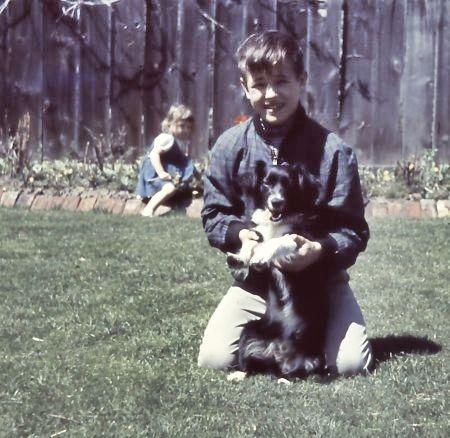
Happy Birthday brother Rod
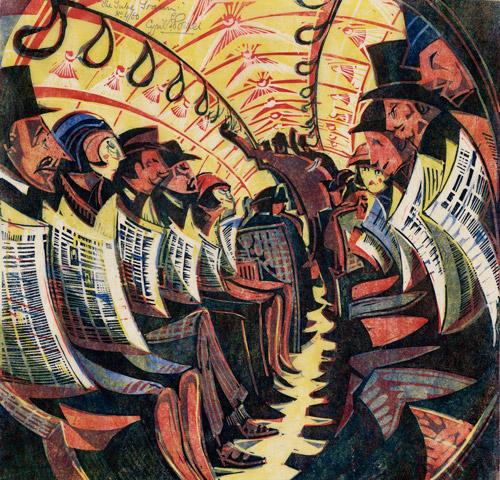
The Tube Train
linocut
(1934)
Cyril Edward Power
1874-1951
Cyril Power And The Joy Of Cutting
Economist
_______________________
The Subway
Edwin Denby
The subway flatters like the dope habit,
For a nickel extending peculiar space.
You dive from the street, holing like a rabbit,
Roar up a sewer with a millionaire's face.
Squatting in the full glare of the locked express
Imprisoned, rocked, like a man by a friend's death,
O how the immense investment soothes distress,
Credit laps you like a huge religious myth.
It's a sound effect. The trouble is seeing
(So anesthetized) a square of bare throat
Or the fold at the crotch of a clothed human being:
You'll want to nuzzle it, crop at it like a goat.
That's not in the buy. The company between stops
Offers you security, and free rides to cops.
Feature: Edwin Denby, 1903–1983
Edited by Karlien van den Beukel
Jacket 21
Edwin Denby at PennSound_______________________
Book of the Forest Path
A New Rendition of the Tao Te Ching
Crispin Sartwell
(....)
21
A path through the forest
is merely where the trees aren't:
a clearing or absence.
What is it? Where is it?
These are not exactly the right questions;
it is an absence in space
that is also the way you are going.
It is surrounded by trees;
if it had a nature, that would be it:
the stuff all around it that touches
and shapes the emptiness within it.
But that's where you move, isn't it?
That's how and where you go.
It is a useful emptiness, an effective absence.
You've never left it, even if you think you have,
and everything you've seen, you've seen from it.
I know it because here I am.
...(more)
_______________________

photo - mw
_______________________
“Bad abba the endgame. In-
seminal doomdom alert:
pueblo naturans or
else. But the breadcrumbs are gone, and the
story goes on, and how
haply an ending no
nextwise has shown us, nor known.”
from “Tale”
in Yesno
by Dennis Lee
Anansi Press, 2007
If it walks like apocalypse: Dennis Lee’s testament Sina Queyras
(....)
This spring Lee has just released both un and yes/no together in a new book titled testament. These original, spare constructions are Celanesque lullabies for a lost planet. Like Celan, Lee has to go on in a language heavy with destruction. The language we use daily to justify our overuse of resources, the escalation of carbon output, and in Canada, the dismantling of our environmental watchdogs at a time when oil sands production ravages and pipelines are set to be laid through some of the last pristine stands of nature in north America. How does he manage?
Recently Lee spoke with the National Post about the process of writing these poems: "With Un - I got really spooked with it. I hadn't seen poetry like this. I didn't even know if it was poetry. I was groping around. I had no idea if it was going to be a book…" This is not a description of the writing process that we hear often enough, to my mind. The poems were leading Lee far out of his own familiar zones, and while he was spooked, he went with it. And he did this for a decade, culminating in the full volume, testament....(more)
_______________________
e-flux 34
Politics of Hate in the USA, Part I: Repressive Tolerance
John Miller
Politics of Hate in the USA, Part II: Right-wing Mysticism and Beliefs
John Miller
_______________________

photo - mw
_______________________
"Self As Selva"
a new poem from Penetralia (forthcoming)
Clayton Eshleman
presented by Jerome Rothenberg
(....)
Once we have cast off the self’s hood, are we left with pure self?
“A dynamic unstable agglomerate of skandas that in itself posses no inherent substantiality or enduring quality and that continues in constant flux until final dissolution at death”
Ah, the selzer of self, the carbonated, carboniferous antiquity of the ever-evaporating self!
Sylph, or elf, as if fragments of self,
gaseous particles that make up that “White Dot calld a Center,”
past lives, or dream incursions, the forge of nightmare,
one’s chest as anvil on which a Muse-muzzled succubus crouches
pounding energy deposits into the helpless dreamer?
No, the dreamer is self’s help-mate, receiving, like 9 inch spikes,
these elf and sylph deposits, the souls of eaten animals,
one’s own dead, those who sip at the ofrenda feasts,
below conscious personality this trillion horde of butterflies pulsates,
a World Tree of sorts, drawing up through its fluttering trunk,
the breath of one’s dead.
Is it this conglomerate
presence/ non-presence of the dead that complexes the Self?
Self as selva, a liana matrix of twintwisted lingo.
...(more)
_______________________
Riley Dog
Blogging still by pushing a button.
_______________________
CBC Music
50 streaming channels 24/7
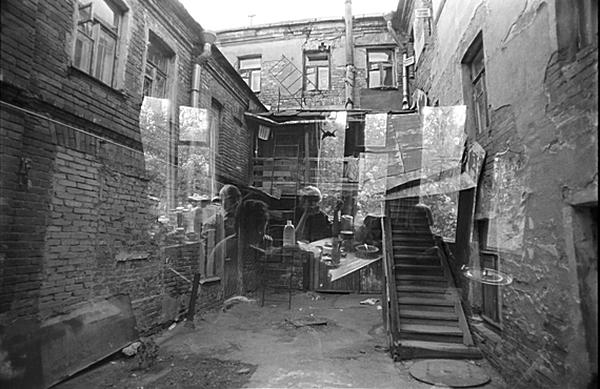
Parallel worlds
Mikhail Dashevsky
Poemas del rķo Wang
_______________________
Reading Tranströmer in Bangladesh
Tarfia Faizullah
poem of the week
split this rock
.......for Meherunnessa Chowdhury, 1924-2010
i.
In Grandmother's house,
we are each a room that
must remain locked. Inside
it, a prayer mat carelessly
folded on a low table, as
though hands that once
pressed down on it are not
below ground. Who has
stripped bare the white
walls of the black velvet
tapestry depicting Ka'bah,
house of God? I let in
the netherworld. Something
rose from underneath. I sit,
wait through my cousin's
sobs. This morning, another
sudden loss: a classmate's
death, she says. Sordid
details flare out like sails
of a ship: mother trapped
in an asylum, father weeping,
son's warm body cradled
in his arms, bone still lodged
in his young throat. To whom
would this not be an inelegant
death--a caught bone, too
much like one of our own?
...(more)
Blog This Rock
_______________________
The Reader and Technology
Toby Litt
granta
Literature can accommodate nostalgia, but only as a houseguest; if nostalgia becomes the landlord, architect and psychoanalyst, literature will have to evict itself.
(....)I think writers will continue to occur but technology and its trivia will cause us to lose something, just as we lost something when we lost the classical education. We write worse because we cannot write classical prose. Yet classical prose is useless for describing the world of 2012, the world that is there – ready to buzz – in your pocket or bag.
Our perceptions outrun the sedentary sentence by much too much; just as we listen to mp3s to hear what an album would sound like were we actually to sit down and listen to it, so we skim-read the classic books to get a sense of what they would be like were we to sit down and dwell on them.
Readers more accustomed to screens – web pages, iPhone displays – will scan a page of text for its contents, rather than experience it in a There was no armed rebellion against Margaret Thatcher, and even if there had been it would not have involved laser guns. gradual linear top-left to bottom-right way. This will make for increased speed and decreased specificity. These readers will be half-distracted even as they read; their visual field will include other things than just the text, because they won’t feel happy unless those things are there. A writer of long, doubling-back sentences such as Henry James will be incomprehensible to them. They won’t be grammatically equipped to deal with him. They won’t be neurologically capable of reading him. Their eyes will photograph fields rather than, as ours do, or did, follow tracks....(more)
via roo370
_______________________
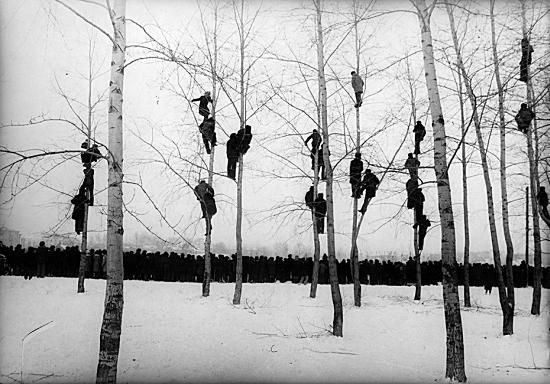
People in Trees
(The Rooks Have Arrived)
Mikola Gnisyuk
1964
_______________________
Native Trees
W. S. Merwin
Neither my father nor my mother knew
the names of the trees
where I was born
what is that
I asked and my
father and mother did not
hear they did not look where I pointed
surfaces of furniture held
the attention of their fingers
and across the room they could watch
walls they had forgotten
where there were no questions
no voices and no shade
Were there trees
where they were children
where I had not been
I asked
were there trees in those places
where my father and my mother were born
and in that time did
my father and my mother see them
and when they said yes it meant
they did not remember
What were they I asked what were they
but both my father and my mother
said they never knew
_______________________
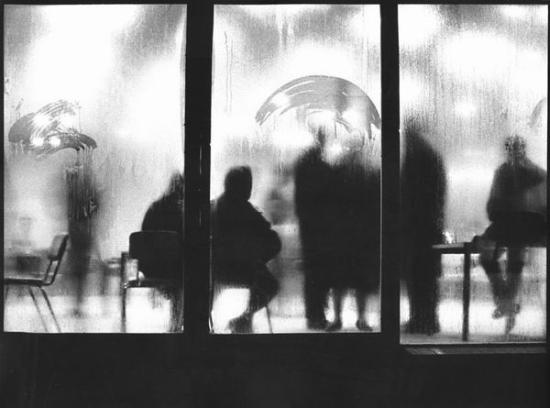
Mikhail Dashevsky
_______________________
Night Singing
W. S. Merwin
Long after Ovid’s story of Philomela
has gone out of fashion and after the testimonials
of Hafiz and Keats have been smothered in comment
and droned dead in schools and after Eliot has gone home
from the Sacred Heart and Ransom has spat and consigned
to human youth what he reduced to fairy numbers
after the name has become slightly embarrassing
and dried skins have yielded their details and tapes have been
slowed and analyzed and there is nothing at all
for me to say one nightingale is singing
nearby in the oaks where I can see nothing but darkness
and can only listen and ride out on the long note’s
invisible beam that wells up and bursts from its
unknown star on on on never returning
never the same never caught while through the small leaves
of May the starlight glitters from its own journeys
once in the ancestry of this song my mother visited here
lightning struck the locomotive in the mountains
it had never happened before and there were so many
things to tell that she had just seen and would never
have imagined now a field away I hear another
voice beginning and on the slope there is a third
not echoing but varying after the lives
after the goodbyes after the faces and the light
after the recognitions and the touching and tears
those voices go on rising if I knew I would hear
in the last dark that singing I know how I would listen
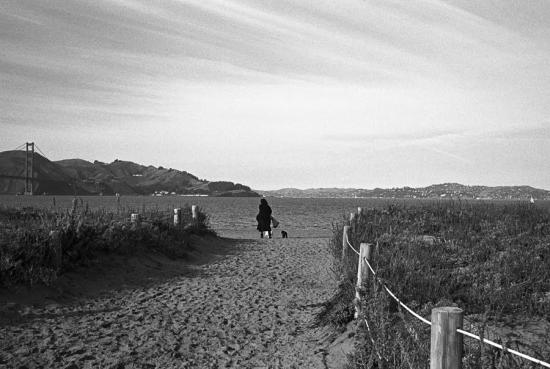
Crissy Field, 2011
Gray City
George LeChat
issuuGeorge LeChat posts at Hiding In Plain Sight
_______________________
“Any fool can get into an ocean . . .”
Jack Spicer
Any fool can get into an ocean
But it takes a Goddess
To get out of one.
What’s true of oceans is true, of course,
Of labyrinths and poems. When you start swimming
Through riptide of rhythms and the metaphor’s seaweed
You need to be a good swimmer or a born Goddess
To get back out of them
Look at the sea otters bobbing wildly
Out in the middle of the poem
They look so eager and peaceful playing out there where the water
hardly moves
You might get out through all the waves and rocks
Into the middle of the poem to touch them
But when you’ve tried the blessed water long
Enough to want to start backward
That’s when the fun starts
Unless you’re a poet or an otter or something supernatural
You’ll drown, dear. You’ll drown
Any Greek can get you into a labyrinth
But it takes a hero to get out of one
What’s true of labyrinths is true of course
Of love and memory. When you start remembering.
My Vocabulary Did This to Me:
The Collected Poetry of Jack Spicer
google books
_______________________
A Very Personal Message To The Poetry Community On Behalf Of Diane Di Prima
Donations For Diane Di Prima
_______________________
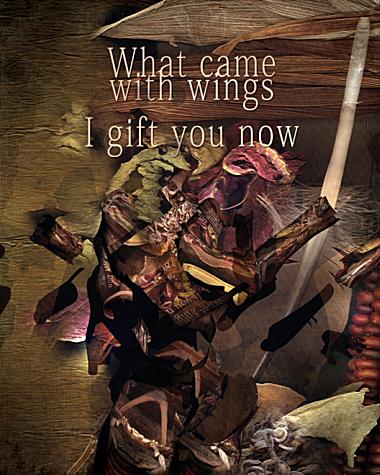
from the series
basho meets sappho meets burroughs
2012
Peter Ciccariello
invisible notes
_______________________
II. Before My Time
Robert Gibbons
Walking the waterfront today, struck by a lack of visibility presented by the fog. Limited, at a hundred yards past land & wharves to ocean. However, not long before rhythms of the body adjust, ears pick up, distinguishing between horns of oil tankers at Eastern European depths, local ferries, & the lighthouse bouncing off each other in harmony, or dissonance. Work goes on. Water traffic may slow down, but engines of draggers & seine boats continue into port. Friday, after all. It's life & style inside of language at the same time for anyone in this business. Nietzsche, for example, says a writer must hear in every sentence the staccato & rubato, divining them out of each syllable & vowel. Having played & composed, his philosophical hammer is closest to that of the piano. My bones are ivories passed down from a vaudeville grandfather I never met. At one point during the walk today fog turned into water droplets, while still remaining fog. They struck me kindly, as if making an overture toward something, or someone, before my Time.

This Time
Robert Gibbons
Nine Point Publishing
Robert Gibbons posts weekly at Time Capsule _______________________
Unlearning The Art Of Getting Lost: The Fiction Of Ivan Vladislavic
Essay by Jan Steyn
quarterly conversation
_______________________
John Cage — A Living Archive
New York Public Library
_______________________
49th Parallel:
An Interdisciplinary Journal of North American Studies
Issue 28: Spring 2012
_______________________
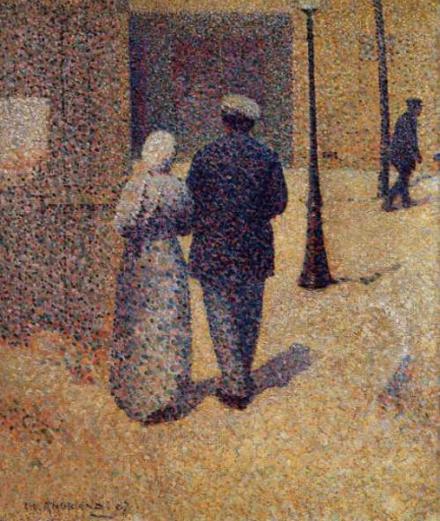
Charles Angrand
b. April 19, 1854
_______________________
What are we talking about when we talk about Lyric?
Sina Queyras
(....)
The question of labor has always been an issue for me. As a supporter of conceptual writing, as someone who has now completely embedded it in my practice and my pedagogy, I note, with frustration, the narrative of conceptual writing = easy poetry (by both proponents and critics of the movement). This is simply not true. This leads to the empty conceptual gesture (as opposed to the empty lyric gesture!). Creating a good conceptual writing project is very difficult and involves much more thinking than the usual poetry projects—even if it involves stealing, appropriating, selecting, retyping. This is all labor intensive. Compiling, recording, transcribing, assembling, visiting archives—this is all very labor intensive. And the success of a project, in the purest conceptual sense, demands that the labor not be cheated on.
Aside from a good clean idea and hard labor, there is still the matter consciousness, the quality of the hand at the helm. The quality that asserts whether the terms of the procedure will be crystal clear or buried beneath the text. How the words will be handled, where they will be found, what is that quality? Is that identity? Self? Author? What is that mysterious creator? That bit that even Goldsmith argues we can never quite do away with. The quality that ensures that even if I have twenty students create erasure poems from the same core text they will all be radically different, the self, the poetic self, will be apparent in every intervention.
One of my central questions then, is can we really posit a binary that asserts a lyric impulse, or lyric creativity as opposed to what might be termed non-lyric, or “uncreative” creativity? Is this what conceptualism has developed in resistance to? What are we talking about when we talk about lyric? Lyric, or identity? As Lisa Robertson pointed out recently, they are not at all the same thing....(more)

Parliament Buildings
looming behind the US embassy
taken from Beechwood Cemetary
Ottawa
photo - mw
_______________________
Saudi Arabia. Nigeria. Venezuela. Canada?
Is our neighbor to the north becoming a jingoistic petro-state?
Will Oremus
It’s well known that America’s dependence on foreign oil forces us to partner with some pretty unsavory regimes. Take, for instance, the country that provides by far the largest share of our petroleum imports. Its regime, in thrall to big oil interests, has grown increasingly bellicose, labeling environmental activists “radicals” and “terrorists” and is considering a crackdown on nonprofits that oppose its policies. It blames political dissent on the influence of “foreigners,” while steamrolling domestic opposition to oil projects bankrolled entirely by overseas investors. Meanwhile, its skyrocketing oil exports have sent the value of its currency soaring, enriching energy industry barons but crippling other sectors of its economy.
Yes, Canada is becoming a jingoistic petro-state.
OK, so our friendly northern neighbor isn’t exactly Saudi Arabia or Venezuela. But neither is it the verdant progressive utopia once viewed as a haven by American liberals fed up with George W. Bush. These days Canada has a Dubya of its own. And judging by a flurry of negative press from around the world—the latest: Archbishop Desmond Tutu and other African leaders are taking out newspaper ads accusing Canada of contributing to famine and drought on the continent—it seems anti-Canadianism could be the new anti-Americanism....(more)
_______________________
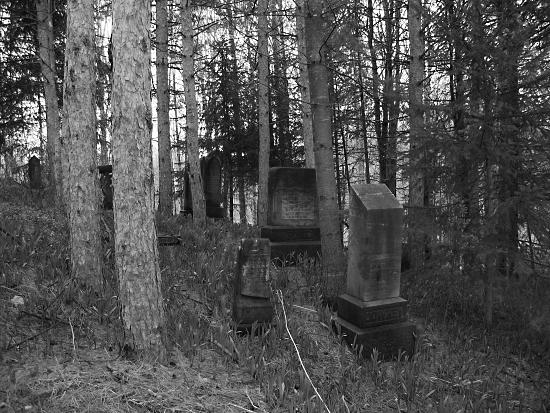
photo - mw
_______________________
The Book of Dead Philosophers
Simon Critchley
google books
ifile pdf
Introduction
This book begins from a simple assumption: what defines human life in our
corner of the planet at the present time is not just a fear of death, but an overwhelming
terror of annihilation. This is a terror both of the inevitability of our demise with its
future prospect of pain and possibly meaningless suffering, and the horror of what lies in
the grave other than our body nailed into a box and lowered into the earth to become
wormfood.
We are led, on the one hand, to deny the fact of death and to run headlong into the watery pleasures of forgetfulness, intoxication and the mindless accumulation of money and possessions. On the other hand, the terror of annihilation leads us blindly into a belief in the magical forms of salvation and promises of immortality offered by certain varieties of traditional religion and many New Age (and some rather older age) sophistries. What we seem to seek is either the transitory consolation of momentary oblivion or a miraculous redemption in the afterlife.
It is in stark contrast to our drunken desire for evasion and escape that the ideal of
the philosophical death has such sobering power.
(....)
To philosophize, then, is to learn to have death in your mouth, in the words you speak, the food you eat and the drink that you imbibe. It is in this way that we might begin to confront the terror of annihilation, for it is, finally, the fear of death that enslaves us and leads us towards either temporary oblivion or the longing for immortality. As Montaigne writes, "He who has learned how to die has unlearned how to be a slave." This is an astonishing conclusion: the premeditation of death is nothing less than the forethinking of freedom. Seeking to escape death, then, is to remain unfree and run away from ourselves. The denial of death is self-hatred. ...
_______________________

photo - mw
_______________________
Doing with Icons makes Symbols; or,
Jailbreaking the Perfect User Interface
Norm Friesen
ctheory
(....)
Mediation and technologies of mediation, whether the sign (Vygotsky), the symbol (Piaget), or the mirror or signifier (Lacan), all play central roles in accounts of human development and activity. They are not simply metaphors enabling, say, a particular conception of memory, perception or language -- as is the case for Plato's wax tablet, Descartes' camera obscura or Chomsky's computational "language organ." Instead, media form the organizing principles for the psyche and its functions overall; they provide the pivotal moment for maturation and humanization -- the point where human development allegedly diverges decisively from the animal to the human. But in these contexts, media are not simply the basis, cause or source of psychological phenomena; they are inextricable from and in a sense even constitutive of them.
(....)
Contrary to Kittler's wishes there is no such a thing as a "perfect graphic user interface" that would utterly banish writing and the symbolic from human-computer interaction. There are instead only imperfect interfaces, and as Kittler himself indicates, these interfaces and encodings entail a kind of writing in which signification is related only indirectly to its causes and effects. I conclude by suggesting that such writing may well be part of the dysfunction of the symptom. The symptom, after all, is a signification or metaphorical manifestation of underlying conditions, but one that is not directly expressive of them. It appears where the three registers -- enactive, iconic, symbolic, or rather, real, imaginary, symbolic -- come into contact with one another. "The symptom," Zizek says, "arises where the world failed, where the circuit of symbolic communication was broken: it is a kind of 'prolongation of communication by other means.'"
Writing becomes a necessity, if not with pen and paper, then at the very least on the computer screen when messages in unadorned ASCII text reporting on BIOS and other hardware appear. Significantly, in the case of an iPod, iPhone or iPad, this kind of writing appears in a process known as a "jailbreak:" an escape from the law -- specifically from the law as manifest in the enforced congruity of the manufacturer's software and hardware. At these moments, software, in its (sometimes deliberate) imperfection or incompatibility, and contrary to Kittler's assertions, surely does exist. And this symptomatic breakage suggests that mediation is not only a central fact of our psychology; but that our psychology is also a central fact of mediation....(more)
_______________________
Yes, life without God can be bleak. Atheism is about facing up to that
Attempts to brighten up atheism's image miss its unique selling point – life can be brutal, yet we live in recognition of that
Julian Baggini
(....)
Atheists have to live with the knowledge that there is no salvation, no redemption, no second chances. Lives can go terribly wrong in ways that can never be put right. Can you really tell the parents who lost their child to a suicide after years of depression that they should stop worrying and enjoy life? Doesn't the appropriate response to 4,000 children dying everyday as a direct result of poor sanitation involve despair at the relentless misery of the world as well as some effort to improve things? Sometimes life is shit and that's all there is to it. Not much bright about that fact.
Stressing the jolly side of atheism not only glosses over its harsher truths, it also disguises its unique selling point. The reason to be an atheist is not that it makes us feel better or gives us a more rewarding life. The reason to be an atheist is simply that there is no God and we would prefer to live in full recognition of that, accepting the consequences, even if it makes us less happy. The more brutal facts of life are harsher for us than they are for those who have a story to tell in which it all works out right in the end and even the most horrible suffering is part of a mystifying divine plan. If we don't freely admit this, then we've betrayed the commitment to the naked truth that atheism has traditionally embraced.
(....)
... I think it's time we atheists 'fessed up and admitted that life without God can sometimes be pretty grim. Appropriating the label "heathen" is part of this. Heathens are unredeemed outcasts from heaven who roam the planet without hope of surviving the deaths of their bodies. They may have values but they are not secured by any divine source. Yet we embrace this because we think it represents the truth. And so we don't just get on and enjoy life, we embark on our own intellectual pilgrimages, trying to make some progress in a universe on which no meaning has been writ. The journey can be wonderful but it can also be arduous and it may end horribly. But there is no other way, and anyone who urges you to follow a path that they promise leads to a bright future is either gravely mistaken or a charlatan....(more)
_______________________
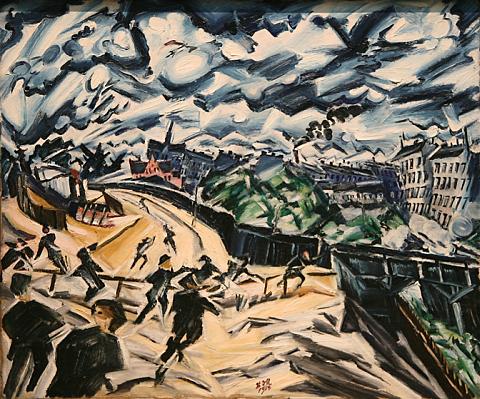
Apocalyptic Landscape
1916
Ludwig Meidner
b. April 18, 1884
 illustration for
The Baron in the Trees by Italo Calvino
Dominic Gnoli
1933 - 1970
_______________________
Of the earth & The Black Sheep Inn
Richie McCaffery
nthposition
The Black Sheep Inn
Sometimes I feel this guilt I carry
is lead-flashing stolen from a local spire
whose clock is from an age when time
was wind-up, the face of perfect stress.
Sometimes I am amazed the time survived
back then, beyond the dawn and dayligone
but now there is a Swiss-made metal scarab
that sits on my wrist and rubs sand grains
between its darting hands. I have amassed
regret like the pearling grit in the belly
of a freshwater mussel, a bullet in the silt
and my lead is toxic if held for too long
but I can bend myself to any drunkard’s ear
and dream of the golden sentence to free me.
Richie McCaffrey: Two Poems
Interview With Richie McCaffery
Four Poems
Richie McCaffery 3 am
_______________________
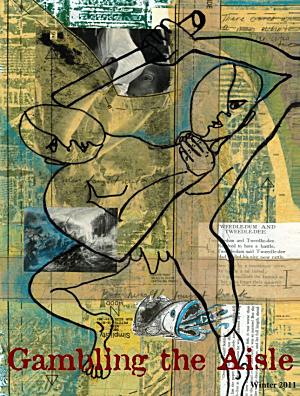
Gambling the Aisle
Volume 1
Cover art, Cane and Able by Dana Kroos
Some New History
Heather Elliott
Zigzaging down the crusty sidewalk I look for our
youth, for the socket they are plugged into, for their pants whose humble
demonstration of gravity never fails to impress, for
their cynicism, for their
xenophobia; they must scrape out all the corners of their rooms
to find strangers in our shrinking
world, where all the rivers are thin veins, where the boundaries of countries
are dancing EEGs. I look at them.
Voyeur, strange voyager, I translate the best I can into the damp
palm of your hand all Helen Keller,
onto the neutral screen of my Blackberry.
Undertaker of dreams, listen to the Killers in the black clap of a room.
Beg Santa not to shoot you. Beg the moon. &
Twilight, teach me about love, what it means to be 14 in America
and what girls should seek—muscles, obsession. I learn:
sex should be desired but not earned. Not for girls. That’s not love.
Death is no obstacle, yes, death and love, how
reverent we are to both, how many candlelit vigils we have held
& the circles on our maps marking our griefs
pile up like ripples on a pond. Now
our shock at Columbine seems so
quaint. Eric & Dylan, how could we not know you?
How could Marilyn Manson shock us so, now when bombs
pop like champagne? So we watch how one thing turns
into another, Hasselhoff’s hairy barrel chest
to this week’s foetus-faced sex symbol.
Oblivious o we trundle on, shucking our griefs off our backs,
singing “We Shall Overcome,” grudgingly tugging them on again.
Now it is obvious that everyone moral, everyone
exceptional, all who think as I do, love America, give
our children flags to hold, spread quilts over the knees of
mothers. So we write our ideology on our arms and needle it into
these populist moments: confronted by rows of oranges
in the supermarket, overcome by the glories
of Farmville, dazzled by strippers professing their
love for Jesus. ...
more in Gambling the Aisle
_______________________
Fight Club
Tuuve Aro
A short story from Himokone
Translated by Lola Rogers
books from Finland
(....)One colourless Wednesday night Karoliina was again staring at the messages zipping across her screen, comments and comments and comments to which she had no reply.
Suddenly the computer crashed.
Karoliina cried out. She pounded the keys, to no effect, chewed on her already gnawed fingernails, and felt like she had to get out of the house.
She wandered the streets, looking down at her snowy feet, directionless. All the streets looked the same, each street leading to another, alleyways all the same. There were no trees, but she didn’t feel like talking to them anyway. She continued on, and got lost in an outlying neighbourhood that she wasn’t familiar with. It was a dubious looking place, the abandoned buildings threatening. The windows were dark or broken, a rat the size of a dog ran out of a gate left ajar.
Karoliina stopped. The wind blew into her right ear. She was already turning back when she noticed a familiar name on a muddy wall: Trailer Alley. She’d heard it in the conversation at the writer’s evening, in connection with some club....(more)
Interview with Tuuve Aro
_______________________

Sam's and A & A's
Young St.
a Mecca of sorts for me
in the late sixties
Vintage Toronto
_______________________
The Whore of Mensa
A Short Story by Woody Allen
From his book "Without Feathers"
(....)
"There's plenty more where that came from."
"What are you trying to say?" I had piqued her curiosity. She sat down again.
"Suppose I wanted to have a party?" I said.
"Like, what kind of a party?"
"Suppose I wanted Noam Chomsky explained to me by two girls?"
"Oh, wow."
"If you'd rather forget it..."
"You'd have to speak with Flossie," she said. "It's cost you." Now was the time to tighten the screws. I flashed my private- investigator's badge and informed her it was a bust.
"What!"
"I'm fuzz, sugar, and discussing Melville for money is an 802. You can do time."
"You louse!"
"Better come clean, baby. Unless you want to tell your story down at Alfred Kazin's office, and I don't think he'd be too happy to hear it."
...(more)
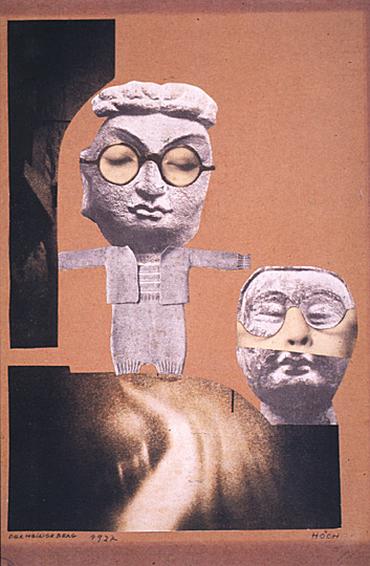
Hannah Höch
Accidental Mysteries, 04.15.12
Design Observer
_______________________
Facelessbook
a haibun
Brenda Hillman
lana turner
My country’s addicted to Facelessbook, it friends them then
bombs them or sometimes it bombs then friends. The drones are
faceless when they fly over mountains friending the villagers & the
queen bee they would friend if they could find her body would
also be faceless. To revisit the word ‘drone’:
huckleberry oak armor-plated wasp gall
an eyeless drone chews
its way out
Some tell me to relax, it’s a stage in late capitalism, just accept this
till the revolution then get guns. Dadaists suggested blind inter-
ventions with screaming & staying drunk. Facelessbook makes it
complicated when people are nice. After our loved one died, we
put the crematorium on the credit card.
...(more)
Brenda Hillman at the Poetry Foundation
_______________________
Here’s a window into a tragedy within the American military: For every soldier killed on the battlefield this year, about 25 veterans are dying by their own hands.
An American soldier dies every day and a half, on average, in Iraq or Afghanistan. Veterans kill themselves at a rate of one every 80 minutes. More than 6,500 veteran suicides are logged every year — more than the total number of soldiers killed in Afghanistan and Iraq combined since those wars began.
— Nicholas D. Kristof
_______________________
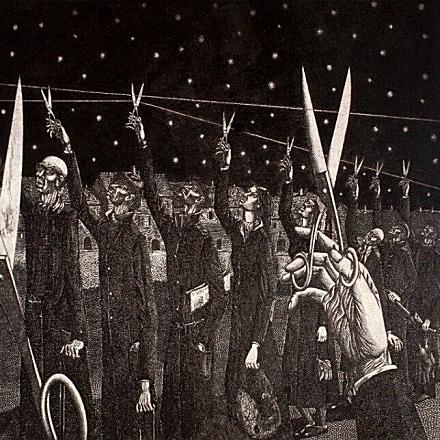
Scissors
Jindrich Pilecek
1998
_______________________
Poems
Heather Christle
It Feels Like It Is on Purpose
When today I leave the house
I hope someone will see me
and use me as an example
of a person not thinking
about what is utmost
in his own mind
and without my knowing it
“the not-thinking person”
will be what I primarily am
and the world will go on lightly turning
with its millions of small adjustments
that make space for us
that let us get through
...(more)
GlitterPony Magazine 13
via Twitter / roo370
_______________________
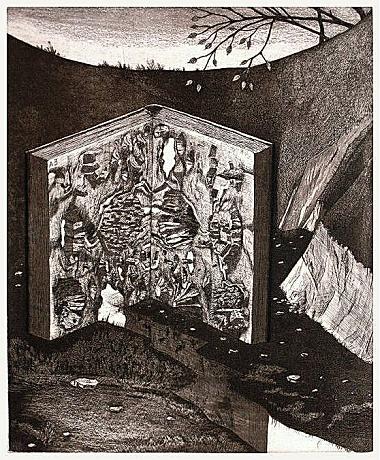
Book
1993
Jindrich Pilecek
_______________________
The Power of Open
The Creative Commons
The Digital Public Domain: Foundations for an Open CultureAuthor
Melanie Dulong de Rosnay and Juan Carlos De Martin (eds.)
Libre Culture: Meditations on Free Culture
edited by David M. Berry and Giles Moss
Libre Culture is the essential expression of the free culture/copyleft movement. This anthology, brought together here for the first time, represents the early groundwork of Libre Society thought. Referring to the development of creativity and ideas, capital works to hoard and privatize the knowledge and meaning of what is created. Expression becomes monopolized, secured within an artificial market-scarcity enclave and finally presented as a novelty on the culture industry in order to benefit cloistered profit motives. In the way that physical resources such as forests or public services are free, Libre Culture argues for the freeing up of human ideas and expression from copyright bulwarks in all forms.
Directory of Open Access Books
_______________________
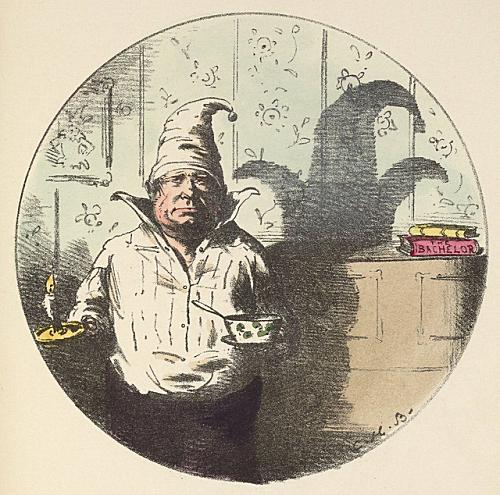 foolscap
Lurking in the Shadows
BibliOdyssey
_______________________
A Little History of Photography Criticism; or, Why Do Photography Critics Hate Photography?
Susie Linfield
An excerpt from
The Cruel Radiance
Photography and Political Violence
University of Chicago Press
(....)
For these critics and others—those I would consider at the center of the modern tradition—cultivating this sense of lived experience was at the heart of writing good criticism. Their starting point was, always, their subjective, immediate experience, which meant that they had to be honest with themselves. Randall Jarrell wrote that “criticism demands of the critic a terrible nakedness… All he has to go by, finally, is his own response, the self that makes and is made up of such responses.” Alfred Kazin agreed; the critic’s skill, he argued, “begins by noticing his intuitive reactions and building up from them; he responds to the matter in hand with perception at the pitch of passion.” For such critics, emotional reactions and critical faculties weren’t synonomous, but they weren’t opposites, either. These critics sought, and achieved, a fertile dialectic between ideas and emotions: they were able to think and feel at the same time, or at least within the same essay.
The great exception to this approach is photography criticism. There, you will hear precious little talk of love, or terrible nakedness, or passion’s pitch. There, critics view emotional responses—if they have any—not as something to be experienced and understood but, rather, as an enemy to be vigilantly guarded against. For these writers, criticism is a prophylactic against the virus of sentiment, and pleasure is denounced as self-indulgent. They approach photography—not particular photographs, or particular photographers, or particular genres, but photography itself—with suspicion, mistrust, anger, and fear. Rather than enter into what Kazin called a “community of interest” with their chosen subject, these critics come armed to the teeth against it. For them, photography is a powerful, duplicitous force to defang rather than an experience to embrace and engage. It’s hard to resist the thought that a very large number of photography critics—including the most influential ones—don’t really like photographs, or the act of looking at them, at all.
...(more)
_______________________
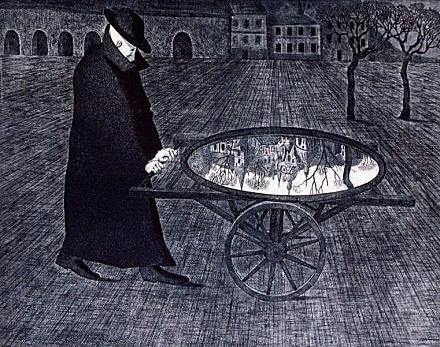
The Window
Jindrich Pilecek
1972
_______________________
Monologues for Orpheus
Robert Kelly
Douglas Messerli's UStheater
(....)
B.
that is the poet’s ailment,
constantly picking up this leaf,
stone, touching that hand,
yearning for his own incarnation,
and who can give it to them?
...(more)
|

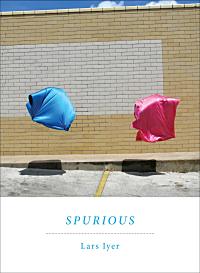


 The Age of Briggs & Stratton
The Age of Briggs & Stratton











































